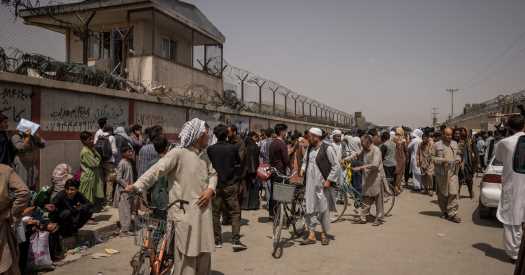Series of U.S. Actions Left Afghan Allies Frantic, Stranded and Eager to Get Out

President Biden’s decision not to begin mass evacuations of Afghans months ago has left thousands of people in limbo.
By Zolan Kanno-Youngs and Annie Karni
WASHINGTON — As President Biden last month defended his decision to end the U.S. military presence in Afghanistan, he delivered a promise as old as the war itself to the Afghans who had risked their lives to assist American troops.
“Our message to those women and men is clear: There is a home for you in the United States, if you so choose,” the president said. “We will stand with you, just as you stood with us.”
But his decision not to begin a mass evacuation of Afghan interpreters, guides and their relatives earlier this year has left thousands of people in limbo, stranded in a country now controlled by the Taliban after 20 years of war.
Even before Mr. Biden announced the withdrawal of U.S. troops, his administration rejected frantic calls from lawmakers and activists to evacuate Afghans, who now find themselves in jeopardy.
Then this summer, Afghanistan’s president, Ashraf Ghani, implored Mr. Biden to hold off on evacuations until U.S. forces were gone for good, fearing that the image would undermine confidence in his government.
Mr. Biden instead took steps to streamline a visa system plagued with backlogs, even though it was never intended for the mass transfer of people in a short amount of time. And in the United States, some officials were expressing concerns about potential political blowback over an influx of refugees.
Taken together, the administration’s actions left Mr. Biden’s promise largely unfulfilled last weekend and led to searing scenes at the Kabul airport, where Afghans clung to the sides of departing American planes. And they raised questions about whether an administration that has said it would prioritize human rights abroad has abandoned the Afghans it depended upon most, dimming the United States’ traditional global image as a sanctuary for the persecuted.
The president on Wednesday defended the U.S. withdrawal and said he did not see a way to leave Afghanistan without “chaos ensuing.” In an interview with ABC News, he was asked whether the exit could have been handled better.
“No, I don’t think it could have been handled in a way that we’re going to go back in hindsight and look — but the idea that somehow, there’s a way to have gotten out without chaos ensuing, I don’t know how that happens,” Mr. Biden said. “I don’t know how that happened.”
But critics said the administration was squarely to blame.
“The failure to evacuate our allies rests solely in the hands of the Biden administration, who ignored veterans and advocates, even when they offered detailed plans on how evacuation to U.S. territory could be managed,” said Chris Purdy, the project manager for the Veterans for American Ideals program at Human Rights First.
Since 2002, the United States has employed Afghans to assist its troops, diplomats and aid workers. Many of those people were threatened, attacked or forced to flee their homes as a result of their work, prompting Congress in 2009 to establish a visa program specifically for those who had helped the U.S. government, as well as their immediate relatives.
The program is separate from the process typically used by those fleeing persecution or torture. About 18,000 people are in the process of applying for the visas, and those applicants have at least 53,000 relatives who would be eligible to join them. Despite a congressional mandate that the United States process the visas in nine months, thousands have faced long delays for vetting.
Source: Read Full Article




